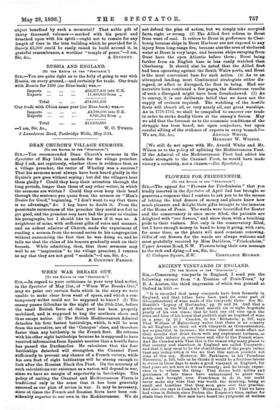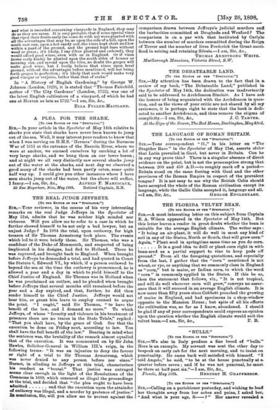ANCIENT VINEYARDS IN ENGLAND.
[To THE EDITOR Or Tug " SFECTATOR.".]
Srn,—Concerning vineyards in England, .1 send you the following extract from "A Treatise of Fruit-Trees," by R. A. Austen, the third impression of which was printed at Oxford in 1665 :—
" It is recorded that many vineyards have been formerly in England, and that tithes have been paid (in some part of Gloucestershire) of wine made of the vineyards there. See Mr. Hartlib's `Legacy of Husbandry,' pp. 23 and 24. And that a gentleman in the Wild of Kent maketh six or eight hogsheds yearly of his own vines; that he hath one old vine upon the sides and tiles of his house that yieldeth nigh an hogshed of wine in a year. (p. 26.) Camden, in his ' Britannia,' p. 357, says That William of Malinesbury writes that there is no country in all England so thick set with vineyards as Gloucestershire, nor so pleLtiful in increase ; the wines there-of made effect not their mouths that drink them with any unpleasant tartness, as being little inferior in sweetness and odor to the French wines. And Mr. Camden adds That this is the reason why many places in that country and elsewhere in England are called Vineyards ; and that it may seem to be the sloathfulneas of the people rather than any indisposition in the air that this nation yieideth not wine at this clay. However, Mr. Parkinson, in his Paradisus Terrestris,' p. 533, tells us he thinks it would be a fruitless labour to strive in these days to make a good vineyard in England. for that years are not now so hot as formerly; and he brings experi- ence in to witness the thing : That divers both nobles and gentlemen of late times have endeavoured to plant vine- yards, and brought over Frenchmen to do it, but could never make any wine that was worth the drinking, being so small and heartless that they soon gave over this practice. And also one says in Camden's • Britannia,' p. 269: Uhat we have had vines in Britain since Probns the Emperor's time, rather for shade than fruit. Now men have heard the judgment of writers and what is recorded concerning vineyards in England, they may do as they see cause. It is very probable that if some special vines that ripen their fruits early (as some do with us) were planted with all the advantages that may be, as upon the side of a hill, upon the south east sun, upon a hot sandy soil, the vines kept short and low within a yard of the ground, and the ground kept bare without weed or grass ; it's likely, I say (thus planted and ordered), they would afford good wines, even with us in England. Or if vines (some early kinds) be planted upon the south sides of houses or morning sun, and spread upon the tiles, no doubt the grapes will make good wine; but I verily believe that vines upon level ground, without the advantages before mentioned, will not bring forth grapes to perfection ; it's likely that such would make very good vinegar or verjuice, better than that of crabs."
In "A History of English Gardening," by George W. Johnson (London, 1829), it is stated that " Thomas Fairchild, author of 'The City Gardener' (London, 1722), was one of the latest English cultivators of a vineyard, of which he had one at Hoxton as late as 1722."—I am, Sir, Sze., ELLA Fr LLER-MAITLAND.



































 Previous page
Previous page